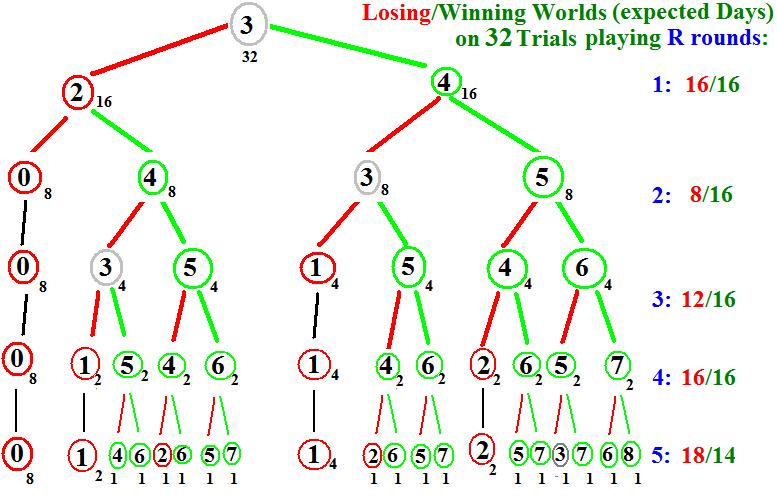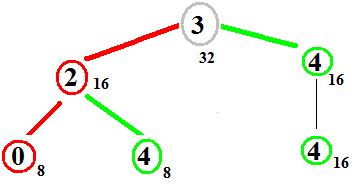Warning on Gambling: Gambling creates all (thereby) possible* futures with certainty. Do not gamble if you are not fully prepared for the worst possible outcome. Only take risks if the losing you will be happy for those parallel copies who found themselves having won. If you know that the feeling and social repercussions of losing will hit you hard, it is not ethical to create those suffering beings. *Under MW/M as currently understood, it is not known what kinds of futures will all be actualized (all possible according to standard quantum mechanics, or pruned by topological Einstein-Everett relativistic space-time gravity corrections, or …), however, losing at something such as gambling roulette is an actualized alternative under all viable theories, even if the odds are very low.
STRAW-MAN: Can we finish with this pretentious bollocks now and start?
Yes! It was asked: On average, we lose, but how to win most days and lose only seldom?
STRAW-MAN: I have 90 thousand dollars but need 10 thousand more for a lifesaving surgery. How do I play roulette in order to maximize the number of worlds where I survive? That’s a similar question, correct?
Let’s see. Gambling means to go on a ride, a random walk of your amount of money, your “bankroll”, away from what you started with. If betting small amounts, the random walk is likely to stay close to the expected average. You can likely gamble for a long time, but the expected average slowly decreases, at a French type roulette table 1/37 of your average bet with every spin of the wheel. So you lose almost every day.
Therefore, betting large amounts should belong to a win-most-days-lose-big-some strategy. You will go home earlier, which you must in order to avoid what happens invariably if you do not stop gambling, namely going down with the expected average (~ the ‘gamblers ruin’, the reason for that casinos let you play as long as possible). For example, if you bet all your money on red at the roulette table, you go home immediately most days.
If putting all your money on red is your whole strategy, you simply let your money sit on red, including the winnings. You go home after the next spin most of the rest of the days. You go home after another spin most of the now remaining, not yet considered days, and so on. This also loses almost all days and wins only very seldom the maximum allowed at the table.
What about the ‘Martingale’ strategy: Bet one dollar on red, then two if you lose, then four if you lose again, then 8 if you lose yet again, and so on. At some point, red is sure to come up. If the next time, you will get back 16 dollars, one more than 1+2+4+8. Some days, red just does not come up and you go home to your bottle of whiskey, having lost more than you usually win. Do you win most days?
The many-world/mind (MW/M) tree looks like this if playing Martingale, walking into the casino with three dollars (neglecting the zero on the roulette table):

The large circled numbers are the bankroll, starting at 3 dollars, de/increasing by the bet amount when losing/winning. The small black numbers are the expected number of days if trying for 32 days. After the second and third spins, there are more winning than losing days. However, the winning worlds are only half the cases, 16 of 32. At the 5th spin, the losing days take over. You lose most days!
STRAW-MAN: Hold on! Only a moron plays Martingale with initial bets almost as large as the starting amount, one dollar of three. Martingale is all about surviving a long losing streak in order to have yet another day of winning a little.
True – Martingale obtains the more happy days the smaller the initial bet compared to the money you bring to the table. But small bets lead to gambling many rounds and feeding the casino.
STRAW-MAN: Oh come on, Mr. MW/M, every single bet makes you play uncountable many rounds in all parallel worlds, feeding the casino.
Also true, but what you said, “another day of winning a little”, shows that also your version of Martingale needs one crucial ingredient, the most crucial to happy gambling generally, well, after being prepared for losing that is.
The most important is to have your Happy-Enough-Ceiling, where if you reach it, you leave with your winnings, happy about: 1) You won again today. 2) Being a rational person with strong will, not falling for deceptive feelings such as “this must be my lucky day; this won’t happen again; let’s go on betting; let’s bet all on 17”. 3) Being wise enough to be happy with what you have, not bothered about what you could perhaps have had or that somebody else at the table got more.
My Happy-Enough-Ceiling is at 4 dollars, so my MW/M has me winning three out of four worlds (or days):

STRAW-MAN: But, wanting to play less boring games, where should our Happy-Enough-Ceiling be generally?
Ahh - that question will lead us to further aspects and to a new didactic challenge, so let's go on here at "Random Walk between Limits versus Here and Now ..." ...





Comments